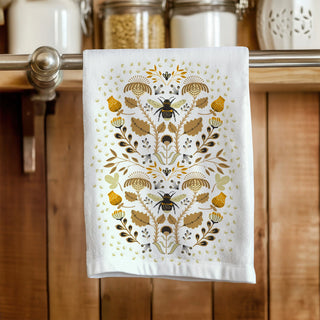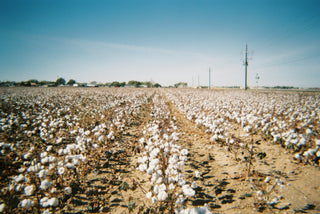For a long time, I wanted to write a blog post about the differences between organic cotton vs regular cotton. But a simple online search produced hundreds of articles on that topic and I didn't want to add to the chorus.
After doing several hours of reading, I realized that far too many writers make erroneous claims about organic cotton and regular cotton and the benefits of organic cotton over conventional.
That frustrates me. As someone who values transparency and honesty in my life and my work, I don't appreciate the misinformation surrounding organic cotton. Because you have to get into the weeds (no pun intended) to get to the critical differences between organic cotton vs non organic cotton.
It's true that the benefits of organic cotton are numerous—no argument here. But when it comes to the use of synthetic pesticides and herbicides in organic cotton cultivation, a closer look is needed.
Claim: Regular cotton does not use synthetic pesticides in its production
You might hear statements claiming that organic cotton production uses only organic pesticides—considered to be pesticides derived from naturally occurring sources such as minerals, plants, or animals. These chemicals are broken down relatively quickly by weather or soil microbes. Examples of organic pesticides include diatomaceous earth (fossilized water microbes), neem oil (a tree oil extract), or pyrethrins (an extract from chrysanthemums).
A broader definition of an organic pesticide, is “a pesticide approved by the USDA for use in organic agriculture.” The USDA makes distinctions about what can be used in organic farming based largely on whether the compound is synthetic or non-synthetic.
It's alarming that the top 10 pesticides used on conventional cotton in the U.S. pose numerous health risks: seven meet the United Nation’s Highly Hazardous Pesticides criteria, six are considered possible, probable or known carcinogens, three are considered “moderately acutely toxic” pesticides, and four are considered endocrine disruptors.
Endocrine disruptors are chemicals that interfere with your body's hormones and the way they work which can impact development, metabolism, reproduction, and other bodily functions.
Knowing this then, for myself at least, it's a worthwhile reason to avoid regular cotton. But is organic cotton better when it comes to the use of pesticides, herbicides and soil amendments? Does organic cotton cultivation only use natural pesticides and herbicides and not synthetic ones?
Organic Cotton and Approved Synthetic Compounds
In the U.S., there is an approved list of pesticides, herbicides and soil amendments for organic production that come from both synthetic and non-synthetic sources. Included in this very long list are substances such as copper sulfate, insecticidal soaps, hydrogen peroxide, and hydrated lime.
(This information comes from the U.S. Code of Federal Regulations (CFR). The CFR is the annual codification of the permanent rules issued by U.S. government agencies, organized into 50 titles covering broad regulatory areas.)
So, the fact is, synthetic substances may be used in organic crop production provided that use of such substances do not contribute to contamination of crops, soil, or water. My feeling is that when people criticize regular cotton for using synthetic chemicals, they are often likely referring to the use of glyphosate (Roundup) in its production and maintenance, but they're unaware of the vast array of synthetic substances used in the production of organic cotton.
The critical difference is that organic cotton production is highly regulated so as to avoid the use of chemicals that can harm the environment and humans. That, of course, is a good thing.
How Do I Know If My Cotton is Truly Organic?
Have you noticed the Better Cotton Initiative (BCI) and the Global Organic Textile Standard (GOTS) labels on products containing organic cotton?
BCI Certification
Organic cotton producers, growers, retailers and suppliers who want to use the BCI label must source at least 10% of their cotton as Better Cotton and who commit to increasing this to at least 50% Better Cotton within five years.
Established in 2005, the Better Cotton Initiative (BCI) is a global non-profit organisation working to improve the sustainability of cotton production worldwide. BCI provides training to cotton farmers on sustainable agricultural practices and offers consumers confidence that the cotton they purchase is responsibly sourced.
GOTS Certification
The Global Organic Textile Standard (GOTS) has a clearly defined set of criteria and is transparent.
GOTS is the worldwide leading textile processing standard for Organic Fibres including Enviromental Criteria, backed up by Third-Party Certification of all textile production.
Having one common standard means textile processors and manufacturers can export their fabrics and garments with one organic certification that is accepted in all major markets. This transparency also gives consumers the power to choose truly organic products sourced from green supply chains.
When we're talking about the products I sell, I think going organic is the right choice for me. Sustainable fabrics have many benefits, not only related to the chemicals and substances used in their cultivation. In a previous blog post, I talked about the benefits of my cotton linen pillow covers that are made with organic fabrics. They're not only artistic, but sourced through partners who put the planet first. And that's a winning combination.






